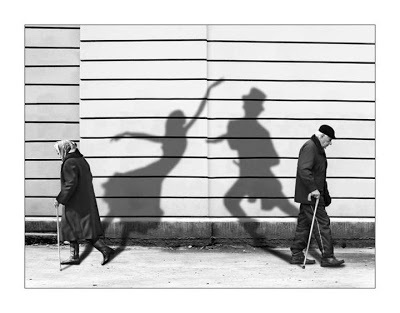Mary Soderstrom's Blog, page 110
July 28, 2012
Saturday Photo: Fountain under Repair or Being in the Game for the Long Haul
 Parc Outremont is one of the lovely smallish green spaces in my neighborhood. In its center is a fountain which I had always thought was done by a Quebec sculptor, but which turns out to have been made in France toward the beginning of the 20th century.
Parc Outremont is one of the lovely smallish green spaces in my neighborhood. In its center is a fountain which I had always thought was done by a Quebec sculptor, but which turns out to have been made in France toward the beginning of the 20th century.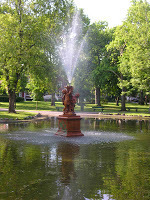
The borough took the sculpture away for repairs this spring, leaving a sign explaining what was going to be done, and the small spray of water in the middle of the pond. It's not nearly as nice was the fountain was, but that's life: maintenance, I'm coming to realize as I age, is just as important as creation.
Published on July 28, 2012 10:35
July 27, 2012
Mick Jagger and Jean Drapeau on the Montreal Olympics: Scratch Your Beard and Get Stoned, Or How a Man Can Get Pregnant
 Today the Oympics begin in London, with much hype. It remains to be seen what kind of legacy this orgy will leave in the troubled UK (look how Greece's Olympic experience set the scene for its current financial situation) but it is clear that Montreal's 1976 experience was a lasting disaster.
Today the Oympics begin in London, with much hype. It remains to be seen what kind of legacy this orgy will leave in the troubled UK (look how Greece's Olympic experience set the scene for its current financial situation) but it is clear that Montreal's 1976 experience was a lasting disaster.We didn't finish paying off the Olympic Stadium until the turn of the new century, even though the mayor at the time Jean Drapeau proclaimed that the Olympics here could not more lose money than a man could get pregnant.
That's the inspiration for Aislin's cartoon, of course. Dr. Henry Morgenthaler was the Montreal doctor who persisted in doing abortions until abortion was de-criminalilzed in 1988.
So what remains? Besides the white elephant of a stadium, this interesting interview with Mick Jagger, talking about effort and fame. His eyes look half-stoned, but obviously the man was sharp even ulnder the influence of whatever..
Published on July 27, 2012 11:43
July 26, 2012
Lawn Not Doing Well: Could Be Hairy Cinch Bugs, and Another Reason to Plant Something Else
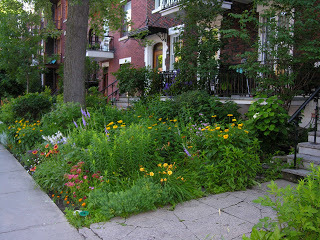 Got yellow spots on your grass?
Got yellow spots on your grass?Could be your neighbors dogs, could be the drought, but they also could be due to bugs living in your lawn, Le Devoir reports this morning.
Hairy cinch bugs have been around these parts of 40 years or so, but apparently this is a particularly good year for them. The winter wasn't too cold, so many eggs survived, and the combination of hot temperatures and sunny weather has encourage their proliferation.
All the more reason to plants something else in that space in front of where you live. Green grass is pleasing to the eye: evolutionary psychologists suggest that we have a hard-wired delight in it, because it suggests the kind of savannah-in-rainy season landscapes that meant good hunting and lots of water for our ancestors millennia ago in East Africa where all humans come from.
But grass isn't meant to be green all the time, and keeping it that way uses a lot of water and, frequently, chemicals. If it's a good year for pests, it's all the more difficult.
The photo is of a neighbor's yard, which shows just how lovely low-maintenance plantings can be. No brown spots in it!
BTW, the couple in Drummondville who got their fingers slapped for planting their front yeard in vegetables, have gotten much press, and, it seems, a reprieve from city officials.
Published on July 26, 2012 07:11
July 25, 2012
For the Young at Heart: Images and Songs
Published on July 25, 2012 08:51
July 24, 2012
Life without Papers: Campaign to Register Children in Burundi
More than ten years ago now, I spent an amazing few weeks in Africa, particularly in Burnundi in the central Great Lakes Region. I was doing rsearch for the book that became The Violets of Usambara, but also trying to make some sense of what foreign do-gooders roles might be in a country struggling with the legacy of civil war and underdevelopment.
Things apparently are considerably better in Burundi now than then, when the country was making tiny steps to overcoming a legacy of ethnic conflict that was reminescnet of that in neighboing Rwanda. But the IRIN is reports that the trappings and conveniences of civil society are still not in place.
Specifically, there is the question of identity cards. Apparently 1.5 million children have not had their births registered, which means that they can not get free health care. When they are school age, more problems were develop. Registration is supposed to be free for infants up to two weeks after birth, but costs the equivalent of $21.40 US afterwards, a sum impossibly high for most people.
However, with the aid of international NGOs campaign is underway in two rural provinces to register children who have no identity cards.
Strange to think of being without papers...
Things apparently are considerably better in Burundi now than then, when the country was making tiny steps to overcoming a legacy of ethnic conflict that was reminescnet of that in neighboing Rwanda. But the IRIN is reports that the trappings and conveniences of civil society are still not in place.
Specifically, there is the question of identity cards. Apparently 1.5 million children have not had their births registered, which means that they can not get free health care. When they are school age, more problems were develop. Registration is supposed to be free for infants up to two weeks after birth, but costs the equivalent of $21.40 US afterwards, a sum impossibly high for most people.
However, with the aid of international NGOs campaign is underway in two rural provinces to register children who have no identity cards.
Strange to think of being without papers...
Published on July 24, 2012 11:56
July 23, 2012
Another Hot Day: Parks in the Early Morning, and Paul Krugman
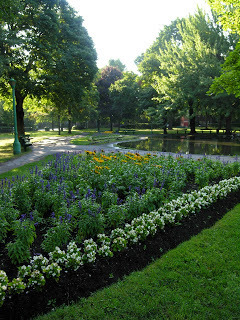 Another hot one, and this is what it looks like about 7:30 in Parc Outremont. Nice, eh?
Another hot one, and this is what it looks like about 7:30 in Parc Outremont. Nice, eh?But these hot summer days are worrying. Where are we going with climate change?
Paul Krugman writes about this today. Heat and drought, like that ravaging the middle of the continent "is likely to be the leading edge of damage from climate change, taking place over the next few decades; the drowning of Florida by rising sea levels and all that will come later."
He continues: "Will the current drought finally lead to serious climate action? History isn’t encouraging.... For large-scale damage from climate change is no longer a disaster waiting to happen. It’s happening now. "
Published on July 23, 2012 09:05
July 21, 2012
Saturday Photo: At the Park Jeanne Says 'Partage!' Or the Beginnning of the Common Good
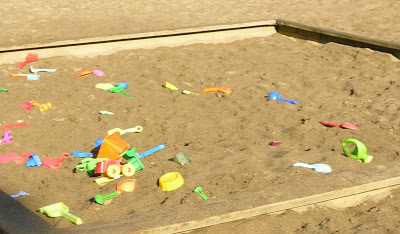 This was taken about 7:30 a.m. in a neighborhood park where we've spent several lovely afternoons this summer with Jeanne.
This was taken about 7:30 a.m. in a neighborhood park where we've spent several lovely afternoons this summer with Jeanne.We go with sand pail and shovel, which she tosses into the sand box as soon as we arrive. Then she starts playing with other kids' toys, some of which have obviously been forgotten or lost or contributed and remain from there from day to day.
At not quite two, one of the big lessons she's having to learn is to share with other children: the swings, the slide, and the toys. Her parents are constantly reminding her of that, to the point that when we arrive at the playground she's begun to say "Partage!" or "Share." Doesn't keep her from sometimes being upset when someone takes her pail, even when she busy filling someone else's with sand, but it's a step in the right direction.
Not all of the parks around have the same cache of forgotten/communal toys, nor did this one at the beginning of the nice weather. What's the difference, given that the social economic status of park users in the general vicinity isn't that disparate?
It's not a question of litter because there is a groundskeeper in the park for 10 hours a day and it's otherwise quite clean. I'd like to think that someone left behind a shovel one afternoon, more or less voluntarily, and others have followed suit for the common good.
Published on July 21, 2012 11:47
More Municipal Ridiculousness
One of my neighbors who just spent a pretty penny to landscape her small front and back yards tells me that our borough administration wouldn't give her a permit to fill all the space in front with artfully arranged perennials.
"The part that belongs to the city had to be grass," the clerk told her when she went in to get the okay for her project, which involved some excavation. "We don't want people to claim damages if we have to go in and do work on the public land."
She said she'd sign something, agreeing not to do that were repairs needed on the gas, sewer and water lines which come in the front. But no dice, despite the fact that grass is hard to grow under our street trees, and a good half of the residents have switched over to some other sort of planting. In fact the houses with the worst looking front yards are those where people have tried to grow grass and given up, to let it brown or grow too long.
"The next battle?" I asked her, who has been instrumental in various struggles involving the neighbors and the city.
She shrugged. Seems before she left someone, whose function and name will remain obscure, whispered that she probably wouldn't get a fine if she planted all the way to the sidewalk! Maybe there's some sense in city hall, after all.
"The part that belongs to the city had to be grass," the clerk told her when she went in to get the okay for her project, which involved some excavation. "We don't want people to claim damages if we have to go in and do work on the public land."
She said she'd sign something, agreeing not to do that were repairs needed on the gas, sewer and water lines which come in the front. But no dice, despite the fact that grass is hard to grow under our street trees, and a good half of the residents have switched over to some other sort of planting. In fact the houses with the worst looking front yards are those where people have tried to grow grass and given up, to let it brown or grow too long.
"The next battle?" I asked her, who has been instrumental in various struggles involving the neighbors and the city.
She shrugged. Seems before she left someone, whose function and name will remain obscure, whispered that she probably wouldn't get a fine if she planted all the way to the sidewalk! Maybe there's some sense in city hall, after all.
Published on July 21, 2012 06:30
July 20, 2012
The Plants Counter-Attack: What's New in Urban Agriculture
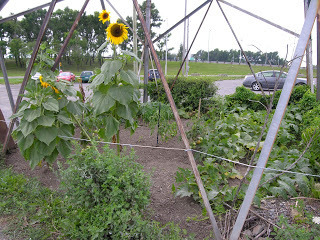 Yesterday's post about a small Quebec town forbidding front yard vegetable gardens sent me thinking about the urban agriculture movement. It certainly is alive and well in Montreal--there will even be a five day conference on it with hands-on workshops next week in the center of the city sponsored by the Université du Québec à Montréal.
Yesterday's post about a small Quebec town forbidding front yard vegetable gardens sent me thinking about the urban agriculture movement. It certainly is alive and well in Montreal--there will even be a five day conference on it with hands-on workshops next week in the center of the city sponsored by the Université du Québec à Montréal. Other efforts: Santropol Roulant, a meals-on-wheels program, has begun a partnership with a group growing food on the island of Montreal commercially.
Hearings on urban agriculture in the city were held in June, prompted by a petition signed by 29,900 who wanted regulations--includingn whether you can have chickens--reviewed and the whole idea of growing your own food in the city encouraged.
About 12,000 people have garden plots in the 95 community gardens sponsored right now by the city. Countless more grow at least a few tomatoes on their own lots or balconies: 51 per cent of those surveyed last year say that they or someone in their family grows at least a little food.
I must admit that I've switched from vegetables to perennials, because our yard is shady and because the squirrels ate almost everything I grew. But the two pears trees thrive, with the crop just about ready to pick. Of course, the squirrels are watching and waiting too....
BTW the photo was taken two years ago of a small garden next to an auto dealership, where someone had taken advantage of the sun (and maybe absence of trees as refuges for squirrels) to grow some nice veggies.
Published on July 20, 2012 07:13
July 19, 2012
Why Not Vegetables in Front Yard Gardens?
A couple in Drummondville, a town about 100 km from Montreal, have run into problems with a city bylaw that limits vegetable growing in front yards. Drummondville would like to do away with such gardens altogether--and will forbid new ones in the future--and have given the couple five days to reduce theis to 30 per cent of the space in front of the house.
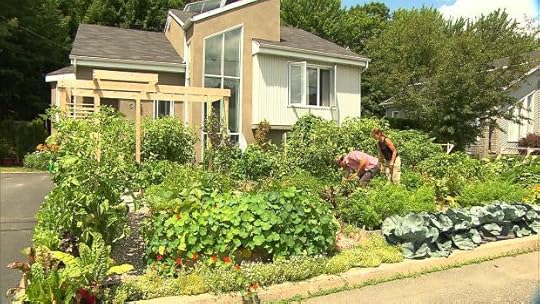 What nonsense! As soneone who has watched with delight as my neighbors have torn up lawns to make more interesting front yard gardens, this seems to me to be a step in the wrong direction. And, as someone who walks regularly in neighborhoos where people--frequently immigrants--grow vegetables and flowers on every available centimeter of dirt, I can only say: grass is boring, and not environmentally sound.
What nonsense! As soneone who has watched with delight as my neighbors have torn up lawns to make more interesting front yard gardens, this seems to me to be a step in the wrong direction. And, as someone who walks regularly in neighborhoos where people--frequently immigrants--grow vegetables and flowers on every available centimeter of dirt, I can only say: grass is boring, and not environmentally sound.
The photo, courtesy of the CBC, shows just how attractive this garden is. A good example of a trend to encourage, it seems to me.
 What nonsense! As soneone who has watched with delight as my neighbors have torn up lawns to make more interesting front yard gardens, this seems to me to be a step in the wrong direction. And, as someone who walks regularly in neighborhoos where people--frequently immigrants--grow vegetables and flowers on every available centimeter of dirt, I can only say: grass is boring, and not environmentally sound.
What nonsense! As soneone who has watched with delight as my neighbors have torn up lawns to make more interesting front yard gardens, this seems to me to be a step in the wrong direction. And, as someone who walks regularly in neighborhoos where people--frequently immigrants--grow vegetables and flowers on every available centimeter of dirt, I can only say: grass is boring, and not environmentally sound.The photo, courtesy of the CBC, shows just how attractive this garden is. A good example of a trend to encourage, it seems to me.
Published on July 19, 2012 11:24

